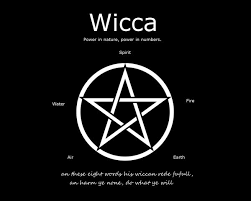Wicca
推荐文章

n. 巫术崇拜
n.
(亦作w-)巫术崇拜,巫术迷信;
英英释义
Wicca[ 'wikə ]
n.
a community of followers of the Wicca religion
the polytheistic nature religion of modern witchcraft whose central deity is a mother goddess; claims origins in pre-Christian pagan religions of western Europe
双语例句
用作名词(n.)
In order to know Wicca it is essential to know its roots.
为了了解巫术崇拜的本质就要知晓它的根源。
Wicca is a joyous religion springing from our kinship with nature.
巫术崇拜是让我们回复与自然血缘关系的欢乐宗教。
权威例句
WiccaWicca
Wicca
Wicca and the Christian Heritage
Wicca : the old religion in the New Age
Wicca and the Christian Heritage: Ritual, sex and magic
The encyclopedia of witches, witchcraft and wicca
Belief Beyond Boundaries: Wicca, Celtic Spirituality and the New Age
Her hidden children : the rise of Wicca and paganism in America
"Out of the Broom Closet": The Social Ecology of American Wicca
Religion as a Discursive Technique: The Politics of Classifying Wicca
Creating sacred space: Outer expressions of inner worlds in modern Wicca
THE HOME COUNTIES WITCH PROJECT ; Wicca, or Witchcraft, Is Gaining Popularity Almost as Fast as the Established Church Is Losing It...
Wicca (n.)
An Old English masc. noun meaning "male witch, wizard, soothsayer, sorcerer, astrologer, magician;" see witch. Use of the word in modern contexts traces to English folklorist Gerald Gardner (1884-1964), who is said to have joined circa 1939 an occult group in New Forest, Hampshire, England, for which he claimed an unbroken tradition to medieval times. Gardner seems to have first used it in print in 1954, in his book "Witchcraft Today" ("Witches were the Wica or wise people, with herbal knowledge and a working occult teaching usually used for good ...."). In published and unpublished material, he apparently only ever used the word as a mass noun referring to adherents of the practice and not as the name of the practice itself. Some of his followers continue to use it in this sense. According to Gardner's book "The Meaning of Witchcraft" (1959), the word, as used in the initiation ceremony, played a key role in his experience:
I realised that I had stumbled upon something interesting; but I was half-initiated before the word, 'Wica' which they used hit me like a thunderbolt, and I knew where I was, and that the Old Religion still existed. And so I found myself in the Circle, and there took the usual oath of secrecy, which bound me not to reveal certain things.
In the late 1960s the term came into use as the title of a modern pagan movement associated with witchcraft. The first printed reference in this usage seems to be 1969, in "The Truth About Witchcraft" by freelance author Hans Holzer:If the practice of the Old Religion, which is also called Wicca (Craft of the Wise), and thence, witchcraft, is a reputable and useful cult, then it is worthy of public interest.
And, quoting witch Alex Sanders:"No, a witch wedding still needs a civil ceremony to make it legal. Wicca itself as a religion is not registered yet. But it is about time somebody registered it, I think. I've done all I can to call attention to our religion."
Sanders was a highly visible representative of neo-pagan Witchcraft in the late 1960s and early 1970s. During this time he appears to have popularized use of the term in this sense. Later books c. 1989 teaching modernized witchcraft using the same term account for its rise and popularity, especially in U.S.1. In order to understand Wicca it is essential to know its roots.
为了理解巫术崇拜的本质就要知晓它的根源。
youdao
2. Lua would be Wicca - A pantheistic language that can easily be adapted for different cultures and locations.
LUA是 威卡教 ---一种泛神论语言,很容易被不同文化和地域的人群所接受。
youdao
3. The theory notably gave rise to several neopagan religions, such as Wicca and Stregheria in the 20th century.
很明显,该理论使某些新异教信仰如20世纪的现代巫术有所增长。
youdao
4. The morality of wicca is based heavily on free will allowing individual freedom with as little interference as possible.
巫术崇拜的道德深深建立在自由意志之上,允许个人自由尽可能不与他人产生利益冲突。
youdao
5. Wicca is based on a deep respect for nature and the certain knowledge that we do not have the right to exploit it for our own gain.
巫术崇拜是基于对自然和某种我们自己还没有正确开发利用的有益知识的深深的尊崇。
youdao
6. Wicca is not traditional folk magic and all magic is not necessarily Wiccan, anymore than all people who pray belong to any particular religion.
巫术崇拜不是传统的民间魔法,而所有的魔法不是巫术崇拜者的必须,再也比不上所有的人们恳求属于任何特别的宗教信仰来得重要。
youdao
7. Wicca is the native tradition for the nations of England, Scotland, Ireland, and Wales, and is rooted in the period before 500 BC which marks the start of the iron age.
巫术崇拜是英格兰、苏格兰、爱尔兰和威尔士国家的本土传统,在标志着铁器时代开始的公元前500年流行起来。
youdao
8. Wicca was illegal in Britain for nearly 1000 years up until 1951, however following it's legalization a large amount of material has been published and Wicca is now accessible to all.
在英国直到1951年为止,将近1000年前的时间内巫术崇拜被认为是违法的事情,然而在出版了大量的资料得到法律认可之后,现在巫术崇拜被所有人接受了。
youdao
9. Wicca was illegal in Britain for nearly 1000 years up until 1951, however following it's legalization a large amount of material has been published and Wicca is now accessible to all.
在英国直到1951年为止,将近1000年前的时间内巫术崇拜被认为是违法的事情,然而在出版了大量的资料得到法律认可之后,现在巫术崇拜被所有人接受了。
youdao
